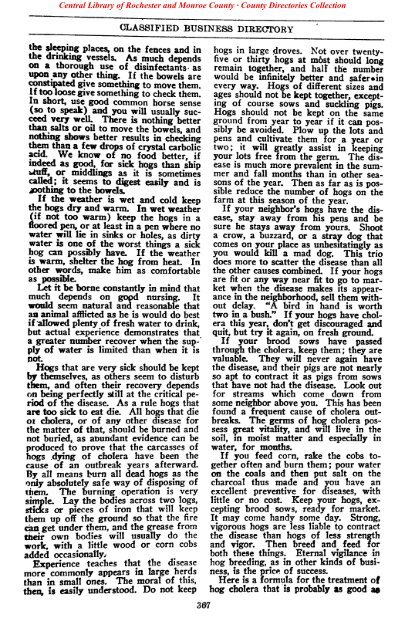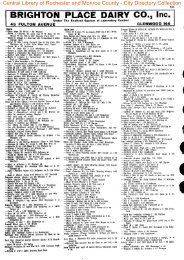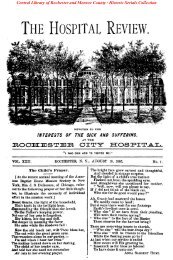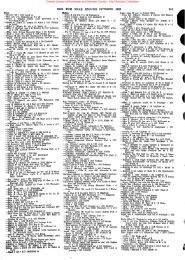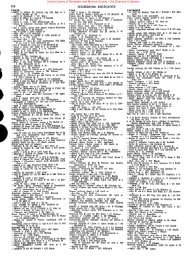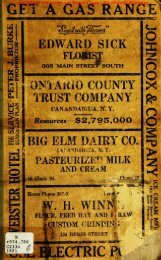The Farm Journal Illustrated Rural Directory of Monroe County, New ...
The Farm Journal Illustrated Rural Directory of Monroe County, New ...
The Farm Journal Illustrated Rural Directory of Monroe County, New ...
Create successful ePaper yourself
Turn your PDF publications into a flip-book with our unique Google optimized e-Paper software.
Central Library <strong>of</strong> Rochester and <strong>Monroe</strong> <strong>County</strong> · <strong>County</strong> Directories Collection<br />
CLASSIFIED BUSINESS DIRECTORY<br />
the sleeping places, on the fences and in<br />
the drinking vessels. As much depends<br />
on a thorough use <strong>of</strong> disinfectants as<br />
upon any other thing. If the bowels are<br />
constipated give something to move them,<br />
if too loose give something to check them.<br />
In short, use good common horse sense<br />
(so to speak) and you will usually succeed<br />
very welL <strong>The</strong>re is nothing better<br />
than salts or oil to move the bowels, and<br />
nothing shows better results in checking<br />
them than a few drops <strong>of</strong> crystal carbolic<br />
acid. We know <strong>of</strong> no food better, if<br />
indeed as good, for sick hogs than ship<br />
Uuff, or middlings as it is sometimes<br />
called; it seems to digest easily and is<br />
jpothing to the bowels.<br />
If the weather is wet and cold keep<br />
the hogs dry and warm. In wet weather<br />
(if not too warm) keep the hogs in a<br />
floored pen, or at least in a pen where no<br />
water will lie in sinks or holes, as dirty<br />
water is one <strong>of</strong> the worst things a sick<br />
hog can possibly have. If the weather<br />
is warm, shelter the hog from heat. In<br />
other words, make him as comfortable<br />
as possible.<br />
Let it be borne constantly in mind that<br />
much depends on good nursing. It<br />
would seem natural and reasonable that<br />
an animal afflicted as he is would do best<br />
if allowed plenty <strong>of</strong> fresh water to drink,<br />
but actual experience demonstrates that<br />
a greater number recover when the sun-'<br />
ply <strong>of</strong> water is limited than when it is<br />
not<br />
Hogs that are very sick should be kept<br />
by themselves, as others seem to disturb<br />
them, and <strong>of</strong>ten their recovery depends<br />
on being perfectly still at the critical period<br />
<strong>of</strong> the disease. As a rule hogs that<br />
are too sick to eat die. All hogs that die<br />
01 cholera, or <strong>of</strong> any other disease for<br />
the matter <strong>of</strong> that, should be burned and<br />
not buried, as atmndant evidence can be<br />
produced to prove that the carcasses <strong>of</strong><br />
hogs dying <strong>of</strong> cholera have been the<br />
cause <strong>of</strong> an outbreak years afterward.<br />
By all means burn all dead hogs as the<br />
oniy absolutely safe way <strong>of</strong> disposing <strong>of</strong><br />
them. <strong>The</strong> burning operation is very<br />
simple. Lay the bodies across two logs,<br />
sticks or pieces <strong>of</strong> iron that will keep<br />
them up <strong>of</strong>f the ground so that the fire<br />
can get under them, and the grease from<br />
their own bodies will usually do the<br />
work, with a little wood or corn cobs<br />
added occasionally^<br />
Experience teaches that the disease<br />
more commonly appears in large herds<br />
than in small ones. <strong>The</strong> moral <strong>of</strong> this,<br />
then, is easily understood. Do not keep<br />
367<br />
hogs in large droves. Not over twentyfive<br />
or thirty hogs at most should long<br />
remain together, and half the number<br />
would be infinitely better and safer*in<br />
every way. Hogs <strong>of</strong> different sizes and<br />
ages should not be kept together, excepting<br />
<strong>of</strong> course sows and suckling pigs.<br />
Hogs should not be kept on the same<br />
ground from year to year if it can possibly<br />
be avoided. Plow up the lots and<br />
pens and cultivate them for a year or<br />
two; it will greatly assist in keeping<br />
your lots free from the germ. <strong>The</strong> disease<br />
is much more prevalent in the summer<br />
and fall months than in other seasons<br />
<strong>of</strong> the year. <strong>The</strong>n as far as is possible<br />
reduce the number <strong>of</strong> hogs on the<br />
farm at this season <strong>of</strong> the year.<br />
If your neighbor's hogs have the disease,<br />
stay away from his pens and be<br />
sure he stays away from yours. Shoot<br />
a crow, a buzzard, or a stray dog that<br />
comes on your place as unhesitatingly as<br />
you would kill a mad dog. This trio<br />
does more to scatter the disease than all<br />
the other causes combined. If your hogs<br />
are fit or any way near fit to go to market<br />
when the disease makes its appearance<br />
in the neighborhood, sell them without<br />
delay. "A bird in hand is worth<br />
two in a bush." If your hogs have cholera<br />
this year, don't get discouraged and<br />
quit, but try it again, on fresh ground.<br />
If your brood sows have passed<br />
through the cholera, keep them; they are<br />
valuable. <strong>The</strong>y will never again have<br />
the disease, and their pigs are not nearly<br />
so apt to contract it as pigs from sows<br />
that have not had the disease. Look out<br />
for streams which come down from<br />
some neighbor above you. This has been<br />
found a frequent cause <strong>of</strong> cholera outbreaks.<br />
<strong>The</strong> germs <strong>of</strong> hog cholera possess<br />
great vitality, and will live in the<br />
soil, in moist matter and especially in<br />
water, for months.<br />
If you feed corn, rake the cobs together<br />
<strong>of</strong>ten and burn them; pour water<br />
on the coals and then put salt on the<br />
charcoal thus made and you have an<br />
excellent preventive for diseases, with<br />
little or no cost. Keep your hogs, excepting<br />
brood sows, ready for market.<br />
It may come handy some day. Strong,<br />
vigorous hogs are less liable to contract<br />
the disease than hogs <strong>of</strong> less strength<br />
and vigor. <strong>The</strong>n breed and feed for<br />
both these things. Eternal vigilance in<br />
hog breeding, as in other kinds <strong>of</strong> business,<br />
is the price <strong>of</strong> success.<br />
Here is a formula for the treatment <strong>of</strong><br />
hog cholera that is probably as good ae


